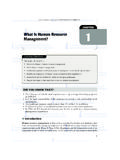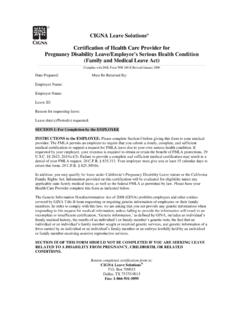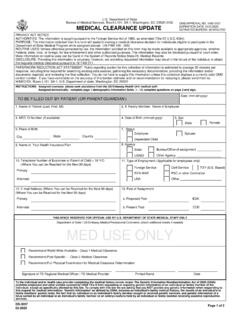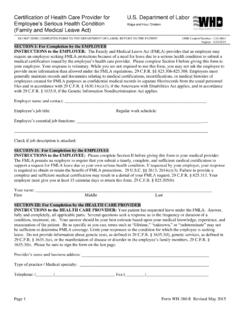Transcription of Equal Employment Opportunity, Anti-Harassment and No …
1 Army EEO, Anti-Harassmentand No FEAR Training for Non-SupervisorsThis course contains mandatory training on: Equal Employment Opportunity Armyanti-harassment policy No FEAR Prohibited personnel practices, includingwhistleblower protection lawsEqual Employment OpportunityEQUAL Employment OPPORTUNITY POLICYThe Army is committed to ensuring Equal opportunity in Employment for Army civilian employees and applicants. The Army is committed to developing and maintaining a professional workplace in which all individuals are treated with dignity and respect. This includes ensuring an environment for Army civilian employees free of discrimination in Employment on the basis of: Race Color Religion Sex (including sexual orientation, gender identity, pregnancy) National origin Age (forty and over) Disability genetic information (individual or family medical history) Reprisal or retaliation for opposing discrimination or participating in discrimination complaint activities, such as being a witness for another Employment OpportunityEqual Employment OpportunityFederal anti-discrimination laws protect employees from illegal discrimination in the terms, conditions, and benefits of their Employment .
2 Some examples of these are: Hiring Promotion Reassignments Pay Leave Awards Performance Evaluations Training Job Classification Reprimands Suspensions Terminations Equal Employment Opportunity Race discrimination involves treating someone (an applicant or employee) unfavorably because the person is of a certain race or has personal characteristics associated with race (such as hair texture, skin color, or certain facial features). Color discrimination involves treating someone (an applicant or employee) unfavorably because the person has a certain skin color or complexion. National origin discrimination involves treating someone (an applicant or employee) unfavorably because the person is from a particular country or part of the world, is or appears to be of a certain ethnic background, or has an , Color, National OriginEqual Employment OpportunityReligious discrimination involves treating someone (an applicant or employee) unfavorably because of the person's religious employee cannot be forced to participate (or not to participate) in a religious activity as a condition of law requires reasonable accommodation of an employee's religious beliefs or practices, unless doing so would cause more than a minimal burden on the Army's operations.
3 Reasonable adjustments to the work environment may allow an employee to practice their religion without disrupting Army Employment OpportunitySex discrimination involves treating someone (an applicant or employee) unfavorably because of that person s includes treating a person (an applicant or employee) unfavorably because of sexual orientation, gender identity, pregnancy, childbirth, or a medical condition related to pregnancy or DiscriminationEqual Employment OpportunityAge discrimination involves treating someone (an applicant or employee) less favorably because of Age Discrimination in Employment Act forbids age discrimination against people who are age 40 or older. It does not cover workers under the age of Employment Opportunity Disability discrimination occurs when a qualified applicant or employee with a disability is treated unfavorably because the person has a disability.
4 Disability discrimination also occurs when a qualified applicant or employee is treated less favorably because the person has a record of a disability (such as cancer that is controlled or in remission) or because the person is regarded as having a physical or mental impairment (even if the person does not have such an impairment).DisabilityEqual Employment OpportunityDiscrimination also can involve treating people unfavorably because they associate with others of a certain group (such as association with someone of a different race or a person with a disability). Association DiscriminationThe use of genetic information in making Employment decisions is information includes information about an individual's genetic tests and the genetic tests of an individual's family members, as well as information about the manifestation of a diseaseordisorderinan individual's family members ( medical history).
5 Family medical history is included in the definition of genetic information because it is often used to determine whether someone has an increased risk of getting a disease, disorder, or condition in the information DiscriminationEqual Employment OpportunityEqual Employment OpportunityIt is illegal to retaliate against applicants or employees because they filed a charge of discrimination, because they complained about discrimination on the job, or because they participated in an Employment discrimination proceeding (such as an investigation or lawsuit).RetaliationEqual Employment OpportunityEmployees Seeking Resolution of Alleged Unlawful Discrimination, Harassment or Retaliation:Must contact the EEO Office within 45 days of becoming aware of the alleged EEO Counselor will attempt to resolve. May offer opportunity to use the alternative dispute resolution process. If unable to resolve the issue(s), will provide a Notice of Right to File a covered by a negotiated bargaining agreement which permits allegations of discrimination have an additional option: Either,Elect to proceed under the negotiated bargaining agreement, o r,File a formal complaint of discrimination with the EEO do Employment Opportunity Equal Pay Act of 1963 Title VII of the Civil Rights Act of 1964 Age Discrimination in Employment Act of 1967 Rehabilitation Act of 1973 Pregnancy Discrimination Act of 1978 genetic information nondiscrimination Act of 2008 The Federal laws enforced by the EEOC that protect employees from Employment discrimination are:Reasonable AccommodationsReasonable AccommodationsA reasonable accommodation is a change in the workplace or the way things are customarily done that helps an individual with a disability do their job.
6 Reasonable accommodations can involve most things that enable an individual to apply for a job, perform a job, or have Equal access to the workplace and employee benefits. Providing a Reasonable AccommodationEqual Employment Opportunity Supervisors are responsible for providing reasonable accommodation to an employee or job applicant with a disability, unless doing so would cause significant difficulty or expense for the Army ("undue hardship"). An employee who believes they need a reasonable accommodation for a disability may make an oral or written request to you. The request does not have to use the term "reasonable accommodation." Supervisors must respond in a timely manner (30 days or less) to a request for reasonable AccommodationsExamples of reasonable accommodations include providing documents and forms in alternative formats like large print or Braille, sign language interpreters, flexible work schedules, telework, and parking spaces, as well as removing physical barriers in an office or a Reasonable AccommodationAn employee must let the supervisor know of the need for an adjustment or change concerning some aspect of the job or a benefit of Employment for a reason related to a medical employee needing a reasonable accommodation on a recurring basis, such as the assistance of a sign language interpreter, must give appropriate advance notice each time the accommodation is AccommodationsIf the nature of the initial communication is unclear, the supervisor (or decision maker)
7 Should ask the requester for a clarification of the need for a reasonable a Reasonable AccommodationGenerally, a job applicant must let the selecting supervisor or the HR officials who are managing the job application process know of the need for an adjustment or change concerning some aspect of the application process; an applicant may request a reasonable accommodation at any time, orally or in writing. A request does not have to include any special words, such as "reasonable accommodation", "disability" or "Rehabilitation Act." A request is any communication in which an individual asks or states a need for a change because of a medical condition. Reasonable AccommodationsA disability is obvious or already known when it is clearly visible or the individual previously provided medical information showing that the condition met the Rehabilitation Act about reasonable accommodations, including medical information , must be maintained in a secure location.
8 It may not be filed with other personnel information pertaining to the a Reasonable AccommodationIf a requester's disability and/or need for accommodation are not obvious or already known, the supervisor is entitled to ask for and receive medical information showing that the requester has a disability that requires accommodation. Reasonable AccommodationsEven if medical information is needed to process a request, the supervisor does not necessarily have to request medical documentation from a health care provider; in many instances the requester may be able to provide sufficient information that can substantiate the existence of a "disability" and/or need for a reasonable an individual has already submitted medical documentation in connection with a previous request for accommodation, the individual should immediately let the supervisor medical documentation is provided it should be evaluated or validated by the organization's occupational health advisor or government medical advisor who can advise the supervisor on the scope of the accommodation a Reasonable Accommodation24 Reasonable AccommodationsUnder the Rehabilitation Act, medical information obtained in connection with the reasonable accommodation process must be kept confidential.
9 This means that all medical information that the supervisor obtains in connection with a request for reasonable accommodation must be kept in secured files separate from the individual's personnel file. This includes the fact that an accommodation has been requested or approved and information about functional limitations. It also means that any employee, supervisor or management official who obtains or receives such information is strictly bound by these confidentiality questions arise from coworkers about what is perceived as "different" or "special" treatment of an accommodated employee, the supervisor should explain the policy of assisting any employee who encounters difficulty in the workplace; and that many of the workplace issues encountered by employees are personal and it is the Army's policy to respect employee a Reasonable Accommodation25 Reasonable AccommodationsThe decision maker may be able to grant the request for reasonable accommodation immediately.
10 If not, an interactive process should be used with the employee to exchange information and search for solutions. At the end of this process, the employee should know whether the request has been granted or denied. The decision maker does not have to provide the specific accommodation requested if there are reasonable and effective alternatives available. During the discussion, alternatives may be decision to grant an accommodation must be promptly communicated, orally and in writing to the requester. A decision to provide an effective and reasonable accommodation other than the one requested is still a decision to grant an accommodation. A decision to deny a request for accommodation must be provided to the requestor promptly in writing. The written denial must state the specific reasons "why" the requested accommodation would result in undue hardship or be ineffective. A decision maker who denies the request must consult with the servicing Disability Program Manager and Staff Judge Advocate before denying any requested a Reasonable AccommodationReasonable AccommodationsIf the initial information provided by the health professional or the requester is insufficient to enable the supervisor to determine whether the individual has a "disability" and/or that an accommodation is needed, the supervisor, in consultation with the organization's occupational health advisor, will explain what additional information is needed.









